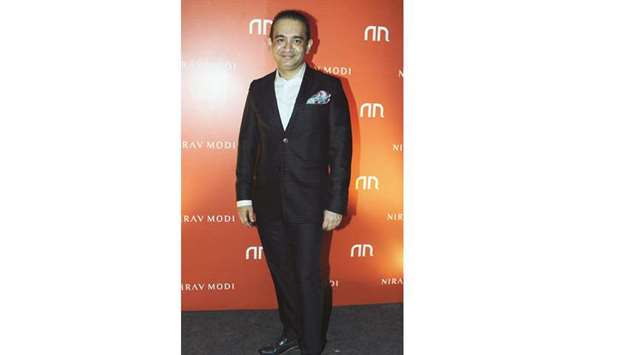It also celebrated the expansion of an Indian business that is now near ruin amid an investigation for an alleged $2bn fraud.
As investigators probe Modi’s alleged use of fake guarantees from the Punjab National Bank to solicit loans, his past decade’s business dealings are also coming under scrutiny by India’s $60bn jewellery industry, which now faces tighter access to credit and more stringent auditing.
Modi’s company Firestar Diamond and another headed by his uncle Mehul Choksi, who is also under investigation for alleged fraud, received about a quarter of the loans made to the nation’s gems and jewellery sector.
Modi, 47, and Choksi, 58, deny any wrongdoing.
Both are currently out of the country. The fallout of the scandal threatens to stymie borrowing firepower for the nation’s jewellers, who are involved in cutting or polishing 12 out of 14 diamonds sold in the world.
If Firestar and Choksi’s Gitanjali Group fail, sales will drop by 16% across India’s jewellery industry, putting in jeopardy as many as 11,000 jobs, Care Ratings Ltd
said on February 27.
With boutique stores also in London’s Mayfair, Hong Kong, Macau, New Delhi and Mumbai, Modi achieved the global reach his relatives only dreamed of, bolstered by a necklace featuring a 12.29 carat “Golconda” diamond that was part of the largest jewellery sale in Asia by Christie’s International in 2010.
Both Modi’s father and grandfather were, like him, diamantaires – a French term for specialist gem-cutters and members of an established diamond-dealing family.
Modi grew up in Antwerp, the Flemish-speaking Belgian city where the majority of the world’s mined diamonds are traded and where some 400 Indian families, mostly from the state of Gujarat, have settled since the 1960s.
A once aspiring musical conductor, Modi is reported to have attended the Wharton School of the University of Pennsylvania before dropping out and moving to India at 19 to train at his uncle’s jewellery company.
He worked almost every day to train in every aspect of jewellery production, from sourcing stones and raw materials to quality control, he told the South China Morning Post in 2016.
While Choksi wanted to create a luxury goods brand rivalling Cartier and Louis Vuitton, it was his nephew’s gem-encrusted designs that adorned celebrities from actress Kate Winslet to Priyanka Chopra, a Miss World 2000 pageant winner and actress.
Though both harboured lofty ambitions, Choksi and Modi chartered different paths.
Modi looked abroad, while his uncle focused more on the domestic market, where his business thrived on franchisee partnerships with newcomers to the industry,
according to interviews with a dozen diamond traders in India and Belgium. The traders, who declined to be identified because of the sensitivity of the matter, characterised Modi as an ambitious playboy with a penchant for paintings who was keen to impress with ostentatious displays of wealth.
India’s Enforcement Directorate, an investigation agency under the Finance Ministry, has seized a trove of assets as part of its investigation into Modi and Choksi, according to posts last month on the agency’s official Twitter account.
Seized items include a Rolls-Royce Ghost, a Porsche Panamera, two Mercedes-Benz vehicles, dozens of imported watches, a farm, and residential and office properties in Mumbai and Pune.
Allegations by the Central Bureau of Investigation are without merit and won’t stand up to the court’s scrutiny, Modi’s lawyer Vijay Aggarwal said, adding that he will apply to the court for the release of the seized assets.
Modi is overseas for business reasons and, as per his communications with the bureau, has expressed concerns over his security and safety if he returns, Aggarwal said in an interview Tuesday.
“Seeing the environment here today – political, personal, social factors and security factors – I am myself not in a position to advise my client to return,” Aggarwal said.
It’s incorrect to refer to his client as a fugitive as he has been responding to all queries from the federal investigating agency, the Enforcement Directorate, and the Punjab National Bank, and has been conducting his business overseas, he said.
Modi established his company in 1999 and took it abroad five years later. With Nirav Modi boutiques in at least six cities, he was eyeing 30 more outlets in 12 countries by 2020, he told the South China Morning Post, appealing to a clientele that was typically female, young, monied and sophisticated.
Modi’s plans were ambitious and set a frenetic pace of expansion, the Business Standard newspaper said in a February 23 report, citing Vipul Ambani, president of finance at Modi’s Firestar International Group, who was arrested by India’s Central Bureau of Investigation last month in connection with the fraud case.

